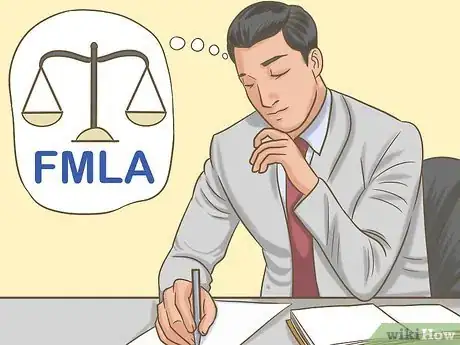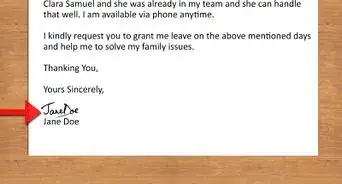This article was co-authored by Jeffrey Fermin and by wikiHow staff writer, Jennifer Mueller, JD. Jeffrey Fermin is a Performance Marketing Manager based in Miami, Florida, who currently works for AllVoices. He’s also the Founder of a full-service marketing company called New Theory. With over 10 years of experience, he specializes in digital marketing and content creation. He earned a Bachelor’s Degree in Psychology and a Bachelor of Education from Florida International University. Jeffrey has won a Microsoft Octas Innovation Award and is a TechCrunch Disrupt Runner-Up.
There are 11 references cited in this article, which can be found at the bottom of the page.
This article has been viewed 53,245 times.
When you're stressed out – whether because of work demands or something in your personal life – it can take a toll on your performance at work. Fortunately, you may be able to take a leave of absence so you can start feeling like yourself again.
Steps
Using Employer-Provided Leave
-
1Review your benefits handbook. Before you request personal or sick leave, make sure you understand your employer's policy and how leave is handled. If you've never requested time off before, talk to one of your coworkers to find out what you need to do.[1]
- You should also understand your employer's expectations, which may not be stated outright in the handbook. You can also talk to coworkers to get a sense of your boss's attitude regarding time-off requests.
-
2Find out how many hours you have available. You may have as many as 3 types of leave provided by your employer (vacation, sick, or personal time) with different requirements and policies for each. Typically you'll accrue hours as you work, but the number of hours of each type you accrue in the same period of time also may be different.[2]
- Your employer also may limit the number of vacation or personal days you can take at one time.
- If you're taking sick time, you may have to provide a doctor's note or other documentation of your condition.
Advertisement -
3Consult a union representative. If you work in a unionized workplace, your union may have resources available for stressed-out employees, including leave options. Your union representative can help you determine what can best help in your situation.[3]
- Your union also may have a leave bank in which employees donate unused leave hours. If you need to take time off for stress-related reasons, you may be able to access those hours if you don't have enough time accrued to take the time off you need.
-
4Submit your request for leave. Make your request in writing, and phrase it as a request, not a demand. You may have earned the hours, but that typically doesn't mean you have the right to take them whenever you want.[4]
- Try to pick the right time to give your manager your request. If your department has a major deadline coming up, or if your manager is working on an important presentation, it might not be the best time to submit a request for time off.
-
5Discuss additional options with your employer. Whether it's work or home life that's stressing you out, your employer may be able to make accommodations that will make things more manageable for you once you return to work.[5]
- If your stress is work-related, you likely aren't the only employee having problems. Talk to your employer about ways to improve the workplace to make it less stressful.
- You could also suggest additional resources to help employees cope with stress. For example, you might have a massage therapist or yoga instructor come to the workplace to work with stressed-out employees.
Taking Statutory Leave
-
1Contact your state's department of labor. Several states, including California, Connecticut, and New Jersey, have state family and medical leave laws that may be more expansive than the federal Family and Medical Leave Act (FMLA).[6]
- Your state's law may specifically list stress, particularly work-related stress, as a reason to take leave. The FMLA does not allow leave specifically for stress. For this reason, it some states it may be easier to take state leave than federal leave.
- Compare state and federal leave options and see which would work better for you. An employment attorney may be able to help you. They usually give a free initial consultation, so you may be able to get some advice on this without having to hire an attorney.
-
2Confirm your employer is covered under the FMLA. All employers with at least 50 employees are covered by the federal law. Employees can take unpaid, job-protected leave under this law if they have a serious health condition, or need to care for a close family member who has a serious health condition.[7]
- Serious health conditions generally include those that require an overnight stay in the hospital, but a hospital stay isn't necessarily required. However, your stress must have caused a diagnosed health condition that prevents you from working.
-
3Gather documentation of your condition. Stress alone does not qualify you for FMLA leave. The stress must cause a serious health condition, which must be documented by a healthcare professional.[8]
- It can be difficult to prove that you have a serious health condition sufficient to qualify for FMLA leave when you have a psychiatric or stress-related condition. You may want to talk to an employment lawyer who specializes in FMLA law.
-
4Provide advance notice of your request. Absent an emergency, both state and federal law require you to give your employer advance notice that you're planning on taking statutory leave. If your employer is covered by state and federal law, use the earlier of the two deadlines.[9]
- For example, if your state only requires 15 days' notice but the FMLA requires 30 days' notice, give 30 days' notice (if possible) so that you're eligible for either.
- Your state's department of labor may have a specific form you can use to provide notice that you are going to request FMLA leave. Otherwise, you can just provide notice in writing. Specify whether you are planning to request leave under FMLA or under a similar state statute.
-
5Request leave from your employer. Your first leave request must clearly state the dates you are requesting off work, the reason, and that you are requesting this leave under either FMLA or a similar state statute.[10]
- Within 5 days of your request, your employer will let you know whether you're eligible for FMLA (or state) leave. If you disagree with your employer's decision, you can file a complaint with the U.S. Department of Labor, or with your state's department of labor.
-
6Have your doctor certify your health condition. For stress-related conditions, your employer will likely require medical certification. You have 15 days to provide it or your leave request may be denied. Contact your healthcare provider and ask them to provide the certification.[11]
- A complete certification lists your diagnosis, when the condition began, how long it will last, and why you are unable to work during the period you requested off work. It may also include basic medical facts about your condition, and any accommodations you will need when you return from leave.
Filing a Worker's Compensation Claim
-
1Consult a worker's compensation attorney. Worker's compensation claims are governed by state law. To file a worker's compensation claim, you must be able to prove that your stress is work-related. Even then, not all states allow claims for work-related stress.
- Worker's compensation laws vary greatly among states, and the procedure and requirements can be complicated. Having an attorney on your side can help ensure you get the compensation you deserve.
- Most worker's compensation attorneys work on a contingency fee basis, meaning that you don't have to pay them any money up front. Rather, they take a small percentage of any recovery you get.
-
2Complete a claim form. Each state has a specific form you'll use to open your claim for worker's compensation. This form must be filed with your state's worker's compensation board. Typically you must also send a copy to your employer.[12]
- Some states also require you to send a copy of your claim to your employer's worker's compensation insurance carrier. The worker's compensation board may let you know where to send it, or you may have to ask your employer for that information.
- The claim form requires you to provide basic information about yourself, your employer, and the nature of the work-related condition you sustained.
-
3Seek medical treatment for your condition. Mere stress won't qualify you for worker's compensation. You have to be medically treated for a specific condition. Stress itself doesn't technically qualify as a condition.
- Generally, this means a doctor needs to diagnose you with a stress-related condition. These often are psychiatric diagnoses, such as post-traumatic stress disorder, anxiety, or depression.
-
4Gather documentation of your condition. Most worker's compensation cases turn almost exclusively on the testimony of your healthcare provider. However, information and observations from others can also help bolster your case.
- For example, testimony from coworkers could help you prove that the stress you were suffering was work-related.
- Employee evaluations also may provide evidence. For example, if you got good performance reviews through last year, when you started receiving poor performance reviews, that could demonstrate how your condition was affecting your work.
-
5Maintain open communication with your employer. A worker's compensation claim can take several months to process. During that time, be sure to keep your employer in the loop and let them know what's going on with you and when you will be back to work.
- You may be able to return to work on a part-time basis, or with specific accommodations. Your doctor will provide a list of these for you to give to your employer. For example, if you work in an open office and it is contributing to your anxiety, your doctor may state that you can return to work provided you are allowed to work in a private room by yourself.
Warnings
- This article primarily covers taking stress leave from work in the United States. If you live in another country, talk to someone in human resources at your workplace, or to an employment attorney.⧼thumbs_response⧽
References
- ↑ https://www.grammarly.com/blog/how-to-ask-for-days-off/
- ↑ https://www.topresume.com/career-advice/the-truth-about-taking-personal-days
- ↑ http://www.working-families.org/network/basics/understanding/family_leave.html
- ↑ https://www.grammarly.com/blog/how-to-ask-for-days-off/
- ↑ http://www.hrmonline.com.au/section/legal/best-respond-stress-leave-request/
- ↑ http://employment.findlaw.com/family-medical-leave/federal-vs-state-family-and-medical-leave-laws.html
- ↑ http://www.dol.gov/whd/regs/compliance/whdfs28f.pdf
- ↑ http://www.ndlaw.com/blog/69/are-employers-required-to-give-stressed-out-employees-time-off
- ↑ http://employment.findlaw.com/family-medical-leave/federal-vs-state-family-and-medical-leave-laws.html
About This Article
If stress has taken a toll on your work, you may be able to file for sick or personal leave or qualify for statutory leave if your stress is causing serious health conditions. Before requesting time off, review your benefits handbook to find out what kind of leave and how much is available. Once you know what kind of leave you want to apply for, make your request in writing and give it to your manager. Another way to take time off for stress is to contact your state’s department of labor to see if you’re eligible for statutory leave. If your employer is covered under the Family Medical Leave Act, you can take unpaid, job-protected leave if you have a serious health issue or need to care for a close family member who is in poor health. While stress alone won’t qualify for this type of leave, you can try to gather documentation from doctors that your stress is causing health problems. To learn how to file for worker’s compensation when taking time off for stress, keep reading!







































































